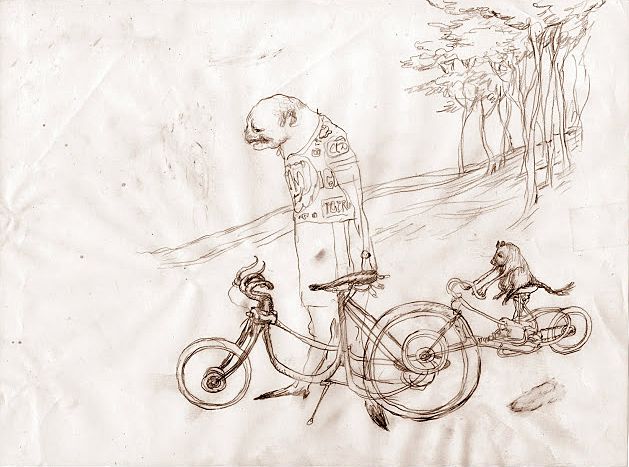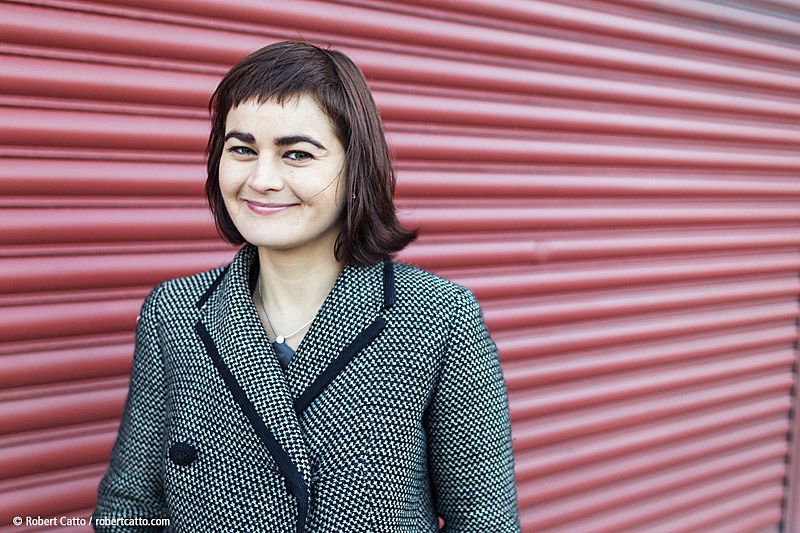You Are Now Entering
Three poems from Ashleigh Young's new collection, Magnificent Moon
Giamatti
In an interview on the eve of his film release,
Paul Giamatti described what people’s souls would look like
if everyone could see them. For example
Willie Nelson’s soul would be an ear of roasted corn.
Giamatti liked the idea, personally, of having a country singer’s soul,
but not Merle Haggard’s, which would be kind of rusty
with lots of buildup.
The guitarist Slash’s soul was ‘a blood orange
left out on a windowsill,
all dried out and leathery’.
Freud’s soul was a piece of Babylonian statuary,
with the fulsome beard, the half-a-lion, the wings.
Jessica Simpson’s soul was hard to pin down, but in the end
was maybe a tape measure. Donald Trump’s was a nice set
of whitewall tyres.
Kim Jong Il’s, ‘a crazy box of crabs’,
and Henry Kissinger’s, ‘a doorknob’.
Giamatti thought his own soul, truthfully, might be
a hand-painted ceramic toad. Something decorative
yet inconspicuous, to go in the yard, something that visitors
would refer to (in hushed wonder) as a ‘thing’: ‘You know,
I kind of
like that thing.’
Giamatti was very good at bestowing souls.
I bet it was a game he liked to play
as he walked round Brooklyn, glowering at the homeless,
the autograph hunters, the blood-sucking poets
the misspellers of his name.
His approach was poetic: you could look at his souls
in a number of ways; they crossed a number of windows, to and fro.
The problem, though: if the soul was (for example) a peahen
then what about the peahen’s soul? Where does it reside?
We will never know the inner life of the peahen
nor that of the ear of roasted corn
that the peahen has eaten.
My mother’s soul might resemble a moon
but that only seems so because I am far away.
In the Giamatti film the soul is burdensome.
His character is weighed down
by all the nameless anxieties inside.
But as it turns out, Paul Giamatti’s character’s soul
is nothing more
than a single, heat-treated chickpea.
As he peers into the plastic cylinder
where his extracted soul rolls about
he looks so lonely for himself
it breaks my heart.
Is that my soul, I used to wonder
when I woke up sad? It was as if in my sleep
my soul had mistakenly risen to the surface, forgetting
that its adaptations were meant for the deep.
Or was that not my soul at all – just the undertow
of a dream? And was my soul like nothing, or nothing more
than a cut driftnet, growing things on its ropes;
was it only the passage of light through shadow?
Afternoon with Simon
A reflection fills the rain
on the window: it’s Simon, proffering his lunch container
filled with gold almonds: almondos he calls them.
His eyes have the shine of all good editors’ eyes:
polished by finding.
I drop my pen, reach over, trailing red
crossed-out fingers:
I have been attacked by a man-eating grammar.
My eyes have been prised from my head
by looking.
Simon studies the lines of rain and eventually
starts talking, beginning each sentence with ‘I suppose’
because he is too hospitable not to leave room
to agree with somebody else
and he also really does suppose,
sometimes assuming that all this is true, sometimes only
imagining it to be so.
We clear a spot amidst the books that nobody
in this country will read. We are the international
editorial team: ours is the great city of color
and Mom and You betcha
circled by ocean not sea.
We make our talk up
like newspaper shelters in the street: strange at first
and lifting at the edges, soon becoming part
of the city’s furniture.
Simon, too, has a voice that lacks volume.
When people catch wind of it
they interrupt to save him
the trouble. Well, their cars go faster. But, goddammit,
he has things to say; like
if in doubt, laugh
even if doing so will offend someone
because the odds are you will offend them even more
if they think you are serious –
which in the current climate is the number one risk –
or they will not notice you and will tramp
right through your house.
In conversation, a quiet-voiced person
needs plenty of space, needs flags to wave, needs
a moat filled with deep water.
Through our window, a giant Dan Carter
stands there in his undies. Imagine having
that confidence – to wear yourself
like you were an expensive set of clothes.
Simon does lunges
in his homemade trousers.
I ask what he is doing but he doesn’t hear;
he’s partially deaf, sometimes partial to being deaf
and I suppose I would have more friends
like Simon if the other people didn’t catch the half-things I say.
This is a job where so many words go forth heroically
only to fall through a rotten board in the floor.
But it does not matter that crucial parts have been lost.
I used to say nothing and now I am talking;
used to live nowhere and now I am eating
gold almonds in the afternoon, with shelter.
You are now entering
It must be nearly empty,
it must begin at a one-train railway station.
A carriage rolls through the construction sites
past the moth-coloured buildings with the half-
hearted mural of men hacking trees.
The carriage climbs the long slope to the bridge.
Here passengers may turn their heads to the left
to view the river stuck in the ground like an iv line.
It must be in the past or the future
because the Northerner no longer runs at this time,
beaming through paddocks of headstones
past houses left out like milk tokens
towards a light that isn’t day, only an older, frailer night.
The town rolls on its back.
Its eyes open, one by one,
unconvinced of light’s relevance
or why anyone should wait for it.
Read our interview with Ashleigh here
cover image: Nicolas de Crécy

